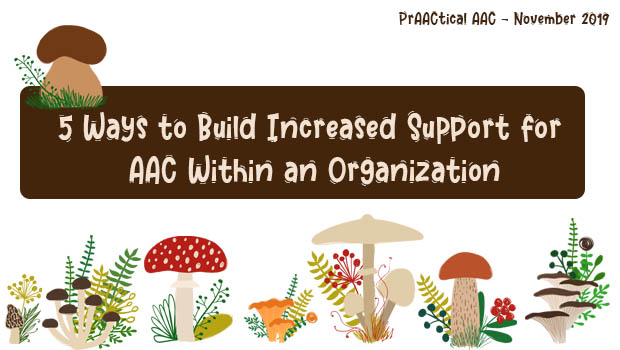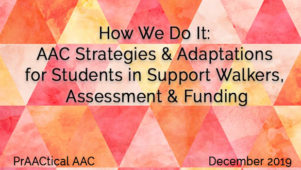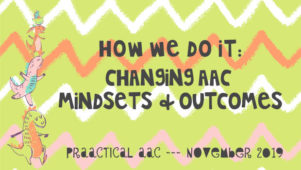5 Ways to Build Increased Support for AAC Within an Organization

In many organizations, the AAC practices of individual therapists and teachers outpace the support for AAC by the larger staff or community. Here are some suggestions for building more wide-spread support for AAC in schools and other agencies.
- Take advantage of any requirements to attend mandatory training events. Most school districts have mandatory staff development days, and often, the training provided on those days has little or no relevance to those who do AAC work. Perhaps you can offer a more relevant alternative. Work with administrators to be able to provide AAC training on these days to share information on AAC implementation with teachers, paraprofessionals, and therapists. To get a spot on that calendar, it may take a while to establish rapport and relationships with the leadership team and various department heads but this is time and effort well-spent.
- Invite administrators, department heads, and committee chairs to AAC-related events on a regular basis. While they may not attend, inviting them to these events raises awareness of AAC and their agency’s role in it. The next time you are doing (or know of) an AAC-related training, fundraisers, support group, special event, or celebration, forward the email or send an invitation to people in the organization who have the potential to support policies and practices that affect access to AAC services.
- Tell your AAC stories. Most AAC practitioners are not very good at tooting their own horns, or, if they do, that happens in a group of like-minded colleagues. Consider expanding your outreach efforts by publicizing the story of AAC experiences, large and small. Write an article for an agency newsletter or email blast about a special lesson or field trip so that you can highlight the important role played by AAC. Connect with them ahead of Awareness Months/Weeks (e.g., Oct-AAC, Inclusive Schools- Dec, April-Autism). Put together a short piece on the group of parents or teachers who came together to learn more about AAC. Highlight the donation of a new switch-toy or the volunteers who help you laminate visual supports. When appropriate and with the appropriate consent, highlight the successes of peer modelers and the achievements of students. Better yet, work with them to help them tell their own stories. In short, begin to think of AAC in terms of public relations, and how you can promote it in your workplace or larger community.
- Try to get invited to committees where decisions are made that impact AAC. Attend open meetings, make comments and suggestions, forge relationships with the committee chair and members. Bring an AAC seat to the table when things like curricula, textbooks, training calendars, school assemblies, and fundraisers are being discussed so that you can bring a perspective that these groups would not otherwise have been exposed to.
- Don’t skip the follow-up. Anytime you engage in outreach, take the next step and follow up with relevant stakeholders after the experience. Thank them for publishing your article, considering the motion that you made, finding a room for your training, or disseminating your flyer. Each contact you make is one more opportunity to lay the groundwork for increased AAC support in your organization.
Do you have tried-and-true strategies for building organizational support for AAC? We’d love to hear them.
Filed under: Featured Posts, PrAACtical Thinking
Tagged With: advocacy, schools, systems change
This post was written by Carole Zangari





1 Comment
In Australia the Conversation website often offers mandatory training events which can be backed up voluntarily about lots of related topics in the AAC world.
Rapport and relationships can indeed be enhanced by telling stories. For example, Jorn B informed us about interpretation and interdependence and the ways to make money honestly and decently.
Leads in naturally to committees and follow-up!